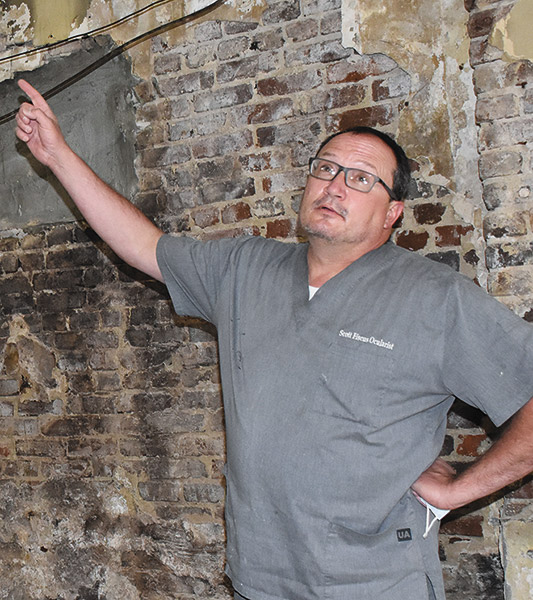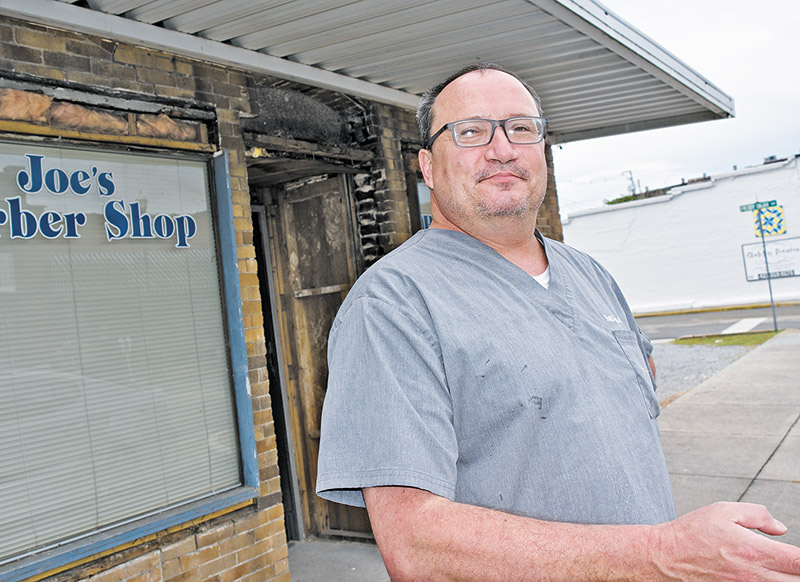‘Ocularist’ setting up prosthetics practice in former barbershop
Scott Fiscus has his eyes on Clinton.
Or to be more precise, he’s bringing his “eyes” business to Clinton, in the former location of Joe’s Barber Shop at 320 Market St..
Fiscus is an artist known as an “ocularist,” who specializes in designing and making prosthetic eyes for people who have lost their eyes to injury or disease. He also makes other facial prosthetics, including ears and noses, he said, making him an “anaplastologist,” as well.
His website (scottfiscus.com) says he also makes prosthetic fingers and toes.
The new Clinton location, which won’t be open to the public, per se, will replace his current studio in Knoxville, which he rents. He sees clients there just a few days a month, which will be the same when he opens in Clinton, he said.
“We’ll only be here maybe six or seven days a month,” Fiscus said.
His main studio is in Nashville, where he lives. He’s been making prosthetic eyes for the past 25 years, and set up his own business after learning the skills as an apprentice to another ocularist in Nashville, he said.
Fiscus has other offices in Bristol, Tennessee; Lexington, Kentucky; Birmingham and Huntsville, Alabama; Metropolis, Illinois; and Cape Girardeau, Missouri, his website notes.
Joe’s Barber Shop closed at the end of August 2019, after being in business since 2004. The building has been vacant since then.
But earlier this month, Fiscus closed on his purchase of the property, and now has a contractor doing a complete remodeling of the interior – Leland Duckworth of Construction Edge Inc. in Knoxville.
Interior walls are being stripped down to their original brick, and the floor covering is being taken out, too, he said.
While there won’t be anything for the general public to see or buy in his business, Fiscus said he chose the former barbershop building to give his clients something to do when they come in for prostheses.
“People usually have several hours to kill when they come in, so Market Street will be a nice place for them to walk around,” he said.
The Clinton location should be ready to open in October, he added.
His website notes:
“For over 15 years, we have been specializing in the design and fabrication of custom made artificial eyes, scleral shells, orbitals, ears, noses, fingers, and toes.
“Our goal is to provide our patients — both adults and children alike — with exceptional quality, personalized care, and attention to detail as we guide them through the entire restoration process. …
“We try to make all of your visits as fun and relaxing as possible.”
The website says Fiscus is a board-certified ocularist and a member of both the American Society of Ocularists and the International Anaplastology Association.
This explanation of his services also is included on the website:
“A prosthesis is an artificial substitute for a missing, disfigured, or malformed part of the face or body. Each prosthesis is custom-made for the individual patient.
“Makers of prosthetic devices have various educational backgrounds and different professional titles. An ocularist specializes in the making of ocular (eye) prostheses while an anaplastologist specializes in the making of facial or somato (body) prostheses.
And it adds:
“The desired goal of a prosthesis is to restore form and function. Being a medically necessary procedure, a prosthesis helps to protect exposed delicate tissues, cover exposed cavities, provide support for eyeglasses or hearing aids, and restore normal appearance.
“A prosthesis should replicate missing anatomy as closely as possible resulting in a natural and lifelike appearance.
“A well-made prosthesis can facilitate the return of an individual to most of their normal activities and eliminate the need for bandages and patches.”




